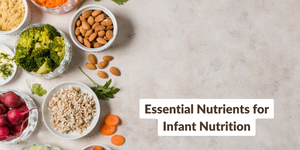An important yet daunting concern for many new mothers is whether to breastfeed or formula feed their baby. Breast milk is universally endorsed as the best food for babies. However, some women may not be able to produce enough milk, or may have a health condition that prevents them from breastfeeding, or may not be around, or they may choose not to do so. Babies who are adopted or are with a caregiver other than the birth mother may also need formula. Formula milk powder is a safe substitute for breast milk with a nutritional composition similar to that of it.
What Are The Types of Formula Milk That You Can Use?
With so many different options for formula milk powder available on the market today, it's not surprising that mothers are often confused. However, you should consult your doctor for the best formula food suited for your baby. Here’s a breakdown of different types of formula milk:
Cow’s Milk Based Formula
This is the most commonly used formula. It is made from modified cow’s milk, with added lactose (milk sugar), vegetable oils, minerals, and vitamins. Iron-fortified cow’s milk formula is recommended for babies in the first year of life.
Soy Based Formula
Soy-based formula does not contain cow’s milk protein or lactose. Such a formula food is suitable for babies who are unable to digest lactose and for those whose parents do not wish to feed them animal protein.
Hypoallergenic Formula
This baby formula food is meant for little ones who are allergic to cow’s milk or soy proteins. The proteins in hypoallergenic formulas have been broken down into smaller proteins that are easier to digest and less likely to cause allergies.
Lactose Free Infant Formula
This formula is used for babies who have symptoms of lactose intolerance, such as excess gas, diarrhoea and fussiness. Permanent lactose intolerance is rare in babies, but a temporary form of lactose intolerance may be seen in premature babies and babies recovering from diarrhoea.
Specialised Formula
Specialised formulas are designed to address the specific needs of premature or low-birth-weight babies and those with certain health conditions.
Infant formula is sold in three forms: ready-to-use liquid (which can be poured directly into a bottle); powders; and concentrates (both of which need to be mixed with water before feeding).
How Much Formula Does A Baby Need?
During their first few weeks of life, your newborn will take approximately 60-90 mL of formula every 3–4 hours. By the end of the first month, this amount will gradually increase to 120 mL every 4 hours. By six months, your baby will be ready to have 180-240 mL of formula in each of four to five feeds per day. These amounts can vary from one baby to another. However, if you feel their feedings are veering too far from the normal, consult your doctor.
Frequently Asked Questions
When To Switch To A Different Formula Food For Baby?
If you notice that your baby is extremely fussy after feeding, is crying more than usual, has diarrhoea, excessive gas, or forceful vomiting, then switching the formula may be considered. Always consult your paediatrician before changing your baby’s formula. Your doctor may recommend switching the formula food for health reasons such as allergies, lactose intolerance, or the baby’s need for more iron. You could also discuss changing formulas for reasons such as affordability, convenience, variation in ingredients or your baby’s taste preferences.
Can You Give Formula Milk and Breastfeed Together?
Yes, it’s perfectly alright to supplement breastmilk with formula milk. Any amount of breastmilk is beneficial, as your baby will continue to get the infection-fighting antibodies from it. However, your breastmilk supply depends on your baby’s demand for it. You may produce less milk when you nurse less often. Talk to the doctor or a lactation consultant about your options and feeding goals so that they can help you navigate the switch to mixed feeding.
How To Store Formula Milk?
Prepared infant formula milk can go bad if left at room temperature. Use up the formula within two hours of preparing or within one hour of beginning the feed. If you do not start to feed the prepared formula within two hours, store it immediately in the refrigerator, but make sure to use it within 24 hours. Any formula that is leftover in the bottle after feeding should be thrown out because the combination of formula and the baby’s saliva can cause bacterial growth. Check out a few precautions to be taken when feeding your baby formula food.
Whether you opt to breastfeed, formula feed, or combine the two, rest easy knowing that when you feel good about your choice, your baby will too!
References:
- Pregnancy birth & baby. Bottle-feeding with the formula [2020]
- NCT. What’s the best kind of formula milk? [2020]
- KidsHealth. Formula feeding FAQs: getting started [2020]
- Healthychildren.org. Choosing an infant formula [2020]
- Healthychildren.org. Amount and schedule of formula feedings [2020]
- Centers for Disease Control and Prevention. Infant formula preparation and storage [2020]






LEAVE A COMMENT